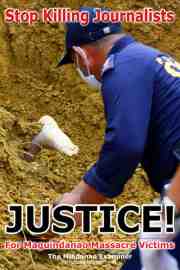
Stickers distributed by the regional newspaper Mindanao Examiner to mark the second year commemoration of the “Maguindanao massacre.”
ZAMBOANGA CITY (Mindanao Examiner / Nov. 23, 2011) – Philippine soldiers detonated Wednesday powerful improvised explosives following a blast at a highway leading to the site where hundreds of people gathered to commemorate the 2009 massacre of 57 mostly journalists in the restive province of Maguindanao.
Officials said at least 5 improvised explosives assembled from various mortars and howitzer canon had been found in different places in Salman village in the town of Ampatuan where various news organizations and media workers held a solemn prayer for those brutally murdered – among them were the wife and sister and relatives and supporters of now Maguindanao Governor Esmael Mangudadatu – allegedly by the powerful and wealthy Ampatuan clan, whose patriarch Andal Sr., and his sons are among 100 people now facing multiple murder charges.
“We have beefed up our patrol following the recovery of the improvised bombs. We have sufficient soldiers deployed around the town to secure those who are commemorating the massacre,” Army Colonel Noel dela Cruz, a spokesman for the 6th Infantry Division, told the Mindanao Examiner.
He said one of the bombs, a 105mm howitzer canon rigged to a radio transceiver and blasting caps, was recovered near Camp Imam Malang, a base of the former rebel group Moro National Liberation Front.
“Continuous paneling is still going on in the town,” Dela Cruz said, referring to the search for more explosives in the Ampatuan town.
Police said at least 9 explosives had been planted in the town. One homemade bomb was also found and defused in the nearby town of Buluan.
Authorities are also hunting down close to 100 people, mostly government militias under the payroll of the Ampatuan clan, implicated in the massacre.
The victims were travelling in a convoy for the filing of candidacy of Mangudadatu, who was then running against Andal Sr. in the gubernatorial elections, when over 200 gunmen stopped them on the highway and seized the whole convoy and brought them on a hill where they were brutally killed and buried in a pit. The body of one journalist, Reynaldo Momay, has not been recovered since then.
The Ampatuan clan denied all the accusations.
Those who participated in the commemoration were calling for justice, but there had been no conviction yet for those accused in the gruesome murders.
Various international press freedom and media advocacy groups have designated November 23rd as the International Day to End Impunity.
In the cities of Davao, Kidapawan and Zamboanga, journalists wearing black t-shirts, gathered in churches and offered prayers and renewed calls for justice.
The Center for Media Freedom and Responsibility in the Philippines said second anniversary of the massacre, the glacial progress of the trial of those accused of planning and carrying it out has become so much a cause for distress because the possibility that it may drag on for years bodes ill for press freedom, human rights and the quest for justice.
It said a year ago, the pace of the judicial proceedings had already set off alarm bells among journalists’ and media advocacy groups, the kin of those killed, and anyone else who still cared about the future of the free press and democracy in this country.
“The Massacre was after all a brutal attack on the free press as an institution necessary in any country with any pretense at democracy, and on the people’s right to choose their leaders. By murdering 58 men and women, among whom were the lawyers, relatives and allies of a candidate for provincial governor, and 32 journalists and media workers, the killers set back press freedom and free elections by so many years, and earned for the country the dubious distinction of being the site, not only of the worst attack on the press in history, but also of a fraudulent democracy,” it said.
The Center for Media Freedom and Responsibility the murders, however, was also a turning point, and a test of the will and capacity of the government not only to assure the safety of its citizens, but also of its ability to provide them justice.
“The Aquino government must not only take the steps necessary to speed up this trial; it must also demonstrate, when journalists are killed, that it has put in place the means to punish the killers and masterminds. To do nothing or little can only lead to more deaths, adding to the six already killed in the line of duty since Mr. Benigno Aquino III took office,” it said.
Aquino has ordered authorities to arrest those linked to the massacre who are still at large and resolve extra-judicial killings in the country.
Harry Thomas, the US Ambassador to Manila, welcomed Aquino’s commitment to bring the perpetrators of this heinous crime to justice.
“We applaud those members of the Philippine National Police, Department of Justice, and Court who are working to expedite the investigation, prosecution and adjudication of cases against those who committed this appalling act of violence. The prosecution of this case is seen by many around the world as demonstrative of the Philippines’ commitment to upholding the rule of law and protecting human rights,” Thomas said in a statement sent to the Mindanao Examiner.
“ We commend the courage of those witnesses who have come forward to testify, despite threats and intimidation, and stand in admiration of the journalists and political and community leaders who carry on their important work in memory of those who lost their lives two years ago. Know that on this day, and every day, we continue to remember the victims of that merciless act committed in Maguindanao on November 23, 2009, and to call for those guilty of this crime to be brought to justice,” he added. (Mindanao Examiner)

